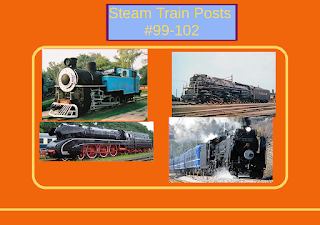Opinion & Answer Part 17: Fireless Locomotive
Greeting Folks,
Im back with another part of my Opinion & Answer Series. On today's part of Opinion & Answer we take a look at one of the most interesting and weird locomotive design that doesn't run on diesel but does run on steam but not one that coal burns to produced the steam to move. So join me on this edition of Opinion & Answer Part 17: Fireless Locomotive.
For people who don't know what a Fireless Locomotive, I decided to make an informal post about them so people can understand what they are and how they operated.
What is a fireless locomotive?
A fireless locomotive runs on a reservoir of compressed air steam, which is filled at intervals from an external source that powered the reciprocating engine.
Advantages & Disadvantage of fireless locomotives:
Advantages
Lower production cost (to be built)
Cleanliness
Less worried for boiler explosion or fire
As they do not emit any exhaust except steam, they can shunt into buildings without endangering the workforce with noxious fumes
They do not require careful monitoring of water levels and boiler pressure, or careful distribution of coal in the firebox for efficient combustion, and thus can be operated by less-skilled staff, not requiring a fully qualified locomotive engineer and fireman.
Disadvantages
Source needed for refilling the locomotive
Limited travel range due to the locomotive’s reservoir
Purpose
Typical usage was in industrial switching where a conventional locomotive was too noxious or risky, such as in a mine or a food or chemical factory; they were also used where a source of air or steam was readily available.
Working Life
Places where the fireless locomotives worked/used
Thermal power stations
Refuse incineration plants
Mines
Chemical Factory
Coal-fired power stations
Sugar Mills
Used for constructing tunnels
Wheel Arrangements
Most wore 0-4-0s or 0-6-0s wheel arrangements locomotives
Some were 0-8-0s wheel arrangement locomotives
Few were 0-10-0 wheel arrangements
Some were B-2 wheel arrangements ,otherwise known as articulated locomotives



